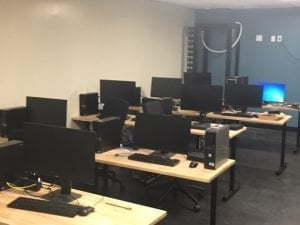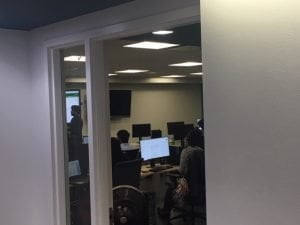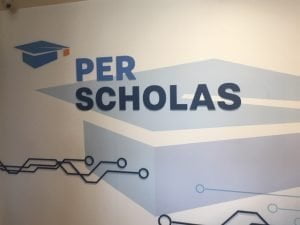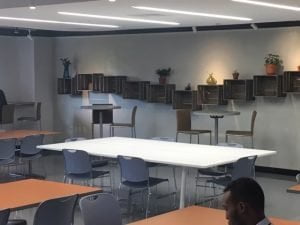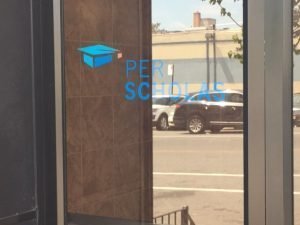Better Than Most is a regular feature of The Business of Giving, examining the best places to work among social good businesses and nonprofit organizations.
Denver: And tonight, we’ll be taking a trip to 138th St. in the Bronx into the offices of Per Scholas. They provide tuition-fee technology training to unemployed or underemployed adults for careers as IT professionals. We’ll begin with their CEO Plinio Ayala and then we’ll hear from other members of the team on what makes their corporate culture so special.
Plinio Ayala: I think every staff member and board member in the organization believes that talent is ubiquitous, and as such, we know that there is incredible talent in communities that are often overlooked – disconnected communities. Our mission is to find those individuals and provide them with quality IT training so that they can move into successful and transformative IT careers

Dan Washington: So they’re constantly coming in contact with individuals and they’re constantly being greeted, and I think that that’s unique because it makes it seem more like a family type situation instead of a corporate type situation where you’re welcomed in like you’re welcomed into someone’s home.
Jameka Hall: This is one thing I love about Per Scholas is that, like everyone said, everyone just seems very genuine. When I was a student, I used to go home and say to my mom, “Something is up with this school. The people here are so weird because they’re always smiling, like there’s something behind these smiles, it’s just awkward.” The staff members are always really, really happy when you see them, and they just give you like this big loud, “Hi, how are you, what class you are in?” and I was like, “Something is up.” I was like I don’t feel comfortable with them, like “What is going on?” It turned out to be that everyone was genuine.
Alycia Thomas: I’m not as nervous to speak up or talk to my manager or other people I’m working about what I believe and what I think to be a best course of action. I think it’s easier for me to talk to people from other places and be more friendly because I’m an introvert by nature. I think I’m able to understand who I am and what my value is as an employee and as a person here in a different way because I see it as feedback from my manager and seeing the work that I’ve done and I’m not being – other work environments have been very toxic and this is not the case here. I think that’s what sets us apart from all offices I have worked in the span of my career is we are not a toxic environment at all, and then when things do come in that are less uncomfortable, we mitigate the issues and get rid of them.
Nelson Gonzalez: I’ve never seen people work so hard in making sure that our mission is carried like what I’ve experienced here. I’ve never been so happy as working so hard because I know that I am moving the needle and making sure that some people acquire employment, not only a job, but significant employment as long as they apply what is taught to them.
Jeannie Smith: When I meet a new person, they’ll ask where I’m working and I’ll say where I’m at and they know so much about the organization. I think that says a lot in terms of the impact and also just sort of the relationship an organization can have, not in terms of just its work culture but the culture that it can contribute to the community that it’s part of, and so I really think that stands out to say a lot. I actually met two people literally last week who literally were so happy to know that an organization of this caliber exists in the Bronx.
Janice Reid: And also one story that really stood out for me is a young lady that came through our program. She, unfortunately, ended up in the foster care system because she lost her mom when she was young, but she went into the foster care system into the shelter system because she aged out foster care. She was being interviewed, and one of the things that she said that got me emotional is that because of Per Scholas, this is the first time she had ever slept in her own bed, and it just boggled my mind because you never think about that. You go to bed at night and you just don’t think about that. She said she’s always slept in someone else’s bed, but now she came to Per Scholas, she got the education, and she was able to get a decent-paying job, get an apartment of her own and buy her own bed. It’s simple things like that makes Per Scholas that wow.
Claire Cuno: And we’re perpetually speaking to different organizations, thinking about what they do, trying to see what they do best, identifying best practices, and figuring out ways that we can braid those into the work that we’re doing in a way that’s helpful for our students and allows our students to build a really strong foundation so that they can have successful careers. I think, as we are trying to be better, the root of all that is student success and sustainability.
Giselle Jaquez: I do not have a college degree, and I was given the opportunity to work here as an associate and I have been able to work my way to my current title now, which has given me such pleasure. It’s something that I would like not even dream of. This opportunity was given to me. I was just given the opportunity to work hard and just prove myself, and I’ve been able to help students and in turn, help myself. It’s just been an amazing learning experience for me. And then I like to answer what’s something about Per Scholas that no one would know unless they work here, and it’s usually when you speak to someone and most organizations that are growing, they don’t really get to spend time with their CEO. I can literally come to work and I’ll see Plinio, and he’ll give me a high five and call me by my first name, which is crazy because it took me so long for me to get to know my fellow colleagues.
Alycia Thomas: But in terms of feedback, I think though we are collaborative and like a family, there is professional boundary so we understand like what is good for us and what’s good for our growth. I don’t think anything is vindictive or pointed in order to make you feel like you are less [spent], everyone’s invested in you doing better and on growing. So I don’t think our environment impedes on us doing the appropriate thing as employees and co-workers in order for us to grow.
Nelson Gonzalez: You find yourself consistently talking to others in other departments that can influence and can work with you. I have not seen silos here at all. I’ve seen inclusion, I’ve seen change, I’ve seen… I see people that are constantly working on their own but when it comes to the challenges, we all come together and we address them as one organization and that’s what I love about this organization.
Janice Reid: I believe the secret sauce is our CEO Plinio Ayala. I believe that because of his heart—first of all, someone here mentioned that they never knew their CEO, or they didn’t have access to the CEO, could never talk to the CEO, and that seems to be the case at many organizations. When I came here, the fact that the CEO knew my name, I looked around like, “You talking to me? Wow!” And one of the things that impressed me was it was after the holidays, it was right after New Year’s, he came in and he personally hugged and greeted every employee and wished them an amazing year, and that just stuck with me.
Jameka Hall: One thing I think I believe is that I mean we are helping people in underserved communities. That’s a big thing. And if we’re helping people underserved communities and we’re also hiring some of them, they of course are going to have the same attitude that they have for the students that are coming in. They know that their employees are going to need the same type of help. Another thing that I actually love is that Per Scholas is not afraid to have uncomfortable conversations. They are not afraid to have uncomfortable conversations, and we have had uncomfortable conversations with each other where we had to say, “You need to stop” or “That’s not the way it looks, that’s not the way it is,” and I think it’s things like that makes this environment safe.
Daniel Washington: We manage conflict basically by looking at what the mission is and what the objective is as an organization and we address it from that perspective. How do we manage personal conflicts? I think and I have seen basically personal conflicts are managed by looking at what the betterment of everybody, including individuals or whatever is. So in other words, if there is some sort of conflict, we look at “What would benefit everyone as a whole? Instead of me or you, it’s us, and how can we grow together from it?”
Claire Cuno: I think that what is so important to me and so unique is that we’re moving super quickly. We’re like expanding nationally. We just redid the Bronx office, and within that, there are folks who are working to establish and build a museum that speaks to the history of Per Scholas. That grounds us and where we came from and as we continue to move and expand, we will never forget what Per Scholas was 25 years ago in the South Bronx. There are images all around that new space that show computers on an assembly line that show all of these like wild, like bouquets of… I’m not a tech person, so for me they’re bouquets of wire, but for other people, they’re probably not bouquets of wires. Bundles, bundles is the word. But it helps every day when I’m in the space or when I’m up in the Bronx, it helps really like ground me in what Per Scholas is, where we’re coming from, and helps me think about where we want to go and how we’re always changing but we’re never forgetting who we are. I think that’s really important and unique to Per Scholas as well.
Giselle Jaquez: I guess my final thought would be that Per Scholas is Per Scholas because every single person that is part of Per Scholas is really defined by our mission. We understand that it’s a very challenging mission, and we come in with our sleeves rolled up, ready to work no matter what, involving uncomfortable conversations, just managers being vulnerable, which is incredible, and we’re here for the same thing at the end of the day, and that’s what we are. That defines us.
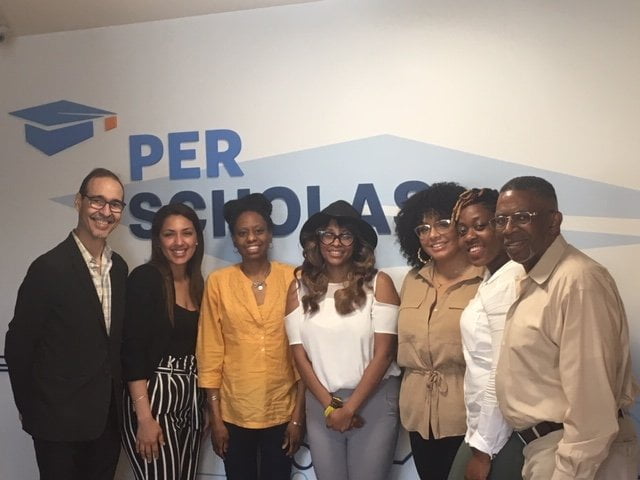
Denver: I want to thank Jacob Macintosh for organizing my visit, and to all those who contributed to this piece: Dan Washington, Janice Reid, Nelson Gonzalez, Jeannie Smith, Jameka Hall, Claire Cuno, GIselle Jaquez, and Alycia Thomas.
To hear this again, read the transcript or see pictures of the participants and offices, simply come visit denver-frederick.com where we’ll post a link to my full interview with Plinio Ayala, the President and CEO of Per Scholas.
The Business of Giving can be heard every Sunday evening between 6:00 p.m. and 7:00 p.m. Eastern on AM 970 The Answer in New York and on iHeartRadio. You can follow us @bizofgive on Twitter, @bizofgive on Instagram and at http://www.facebook.com/BusinessOfGiving


